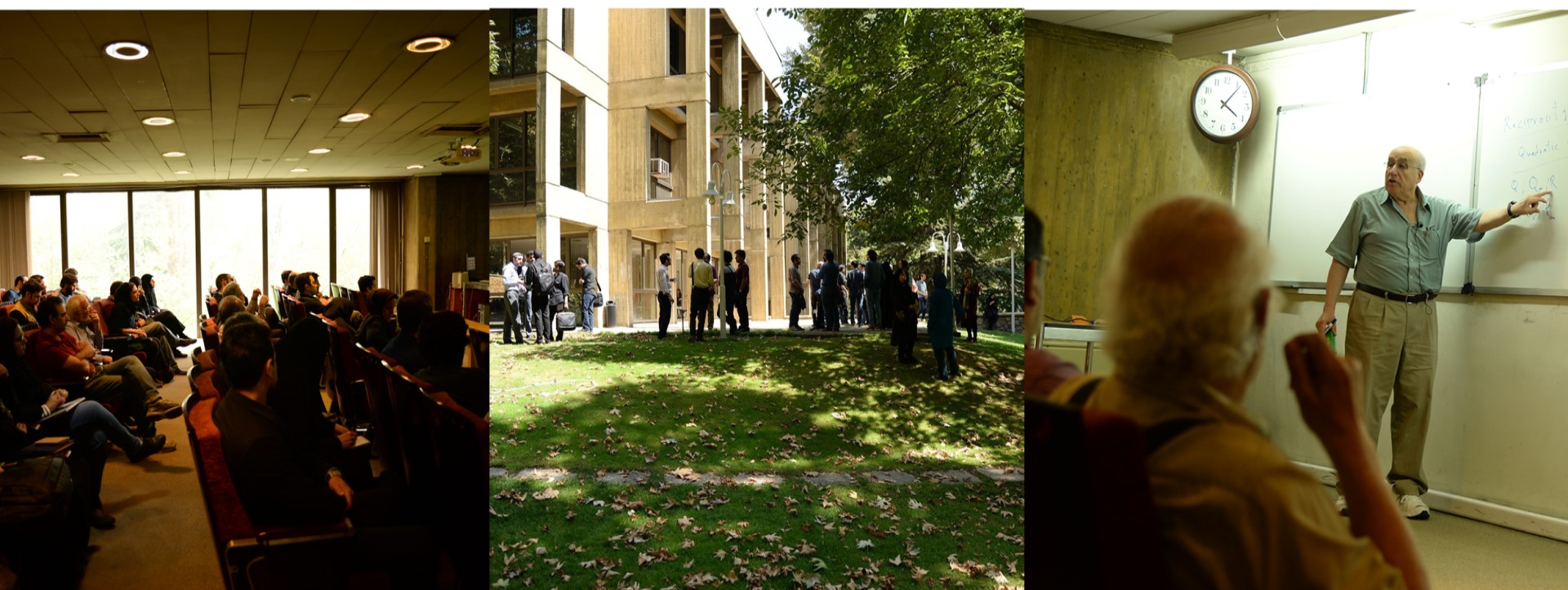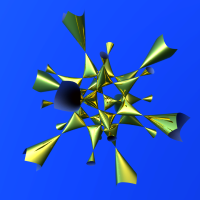
IPM Algebraic Geometry Seminar
IPM is holding a biweekly zoom Algebraic Geometry seminar for Winter/Spring 2023.

Where: Zoom
Meeting ID: 908 611 6889
Passcode: 13440 × the number of lines on a cubic surface
Seminar mailing list: google group
Poster: here
Past Talks
Speaker: Jihun Park, IBS Center for Geometry and Physics, POSTECH (Korea)
Title: Sasaki-Einstein 5-manifolds and del Pezzo surfaces
Abstract:This talk briefly explains how to find closed simply connected Sasaki-Einstein 5-manifolds
from K-stable log del Pezzo surfaces. It then lists closed simply connected 5-manifolds that are known so
far to admit Sasaki-Einstein metrics. It also presents possible candidates for Sasaki-Einstein 5- manifolds
to complete the classification of closed simply connected Sasaki-Einstein 5-manifolds.
Date: June 7, 2023
Video link
Passcode: ?SH#pjv8
Speaker: Paolo Cascini, Imperial College London (UK)
Title: On the Minimal Model Program for complex foliated varieties
Abstract: I will survey some recent developments regarding the minimal model program for
foliations defined over a complex algebraic variety, together with some applications towards the study of fibrations in birational geometry.
Date: May 24, 2023
Video link
Passcode: YLGG=B4C
Speaker: Lutz Hille, University of Münster (Germany)
Title: Polynomial invariants for triangulated categories with full exceptional sequences
Abstract: For a full exceptional sequence of vector bundles on the projective plane there
is a remarkable equation, the so-called Markov equation, in terms of the ranks of the three vector bundles. This
equation, slightly modified, has been used in a joint work with Beineke and Brüstle for cluster mutations for quivers with three vertices.
The aim of this talk is to define the natural generalization for full exceptional sequences with n members. This
leads to the notion of a polynomial invariant, that is a polynomial in indeterminants x(i,j) for i less than j
between 1 and n. This allows to evaluate such a polynomial at any full exceptional sequence. We define a
polynomial invariant to be a polynomial whose value does not depend on the full exceptional sequence, it only depends on the underlying category.
In the talk we define polynomial invariants, present several examples and relate them to the natural braid group action. Eventually, we classify all polynomial invariants.
Date: May 10, 2023
Video link
Passcode: e7#T^F*m
Speaker: Carolina Araujo, IMPA (Brazil)
Title: The Calabi Problem for Fano Threefolds
Abstract: The Calabi Problem is a formidable problem in the confluence of differential
and algebraic geometry. It asks which compact complex manifolds admit a Kähler-Einstein metric.
A necessary condition for the existence of such a metric is that the canonical class of the
manifold has a definite sign. For manifolds with zero or positive canonical class,
the Calabi problem was solved by Yau and Aubin/Yau in the 1970s. They confirmed
Calabi's prediction, showing that these manifolds always admit a Kähler-Einstein
metric. On the other hand, for projective manifolds with negative canonical class,
called “Fano manifolds”, the problem is much more subtle: Fano manifolds may or may not
admit a Kähler-Einstein metric. The Calabi problem for Fano manifolds has attracted much
attention in the last decades, resulting in the famous Yau-Tian-Donaldson conjecture. The conjecture,
which is now a theorem, states that a Fano manifold admits a Kähler-Einstein metric if and only if it
satisfies a sophisticated algebro-geometric condition, called “K-polystability”. In the last few years,
tools from birational geometry have been used with great success to investigate K-polystability.
In this talk, I will present an overview of the Calabi problem, the recent connections
with birational geometry, and the current state of the art in dimension 3.
Date: April 26, 2023
Video link
Passcode: aa%%EX7T
Speaker: Amir Hashemi, Isfahan University of Technology (Iran)
Title: On the computation of staggered linear bases
Abstract:Grobner bases are a powerful tool in polynomial ideal theory with many applications in
various areas of science and engineering. A Grobner basis is a particular generating set for a given
ideal which represents many useful properties of the ideal. The general theory of Grobner bases along
with the first algorithm for constructing them were introduced by Buchberger in 1965 in his Ph.D. thesis.
An staggered linear basis is indeed a linear basis containing a Grobner basis for a given ideal.
This notion was first introduced by Gebauer and Moller in 1988, however the algorithm that they described
for computing these bases was not complete. In this talk, we first give a brief overview on the theory of
Grobner bases (as well as of staggered linear bases) and then present a simple algorithm for computing staggered linear bases.
Date: March 1, 2023
Video link
Passcode: 7fFN0!uM
Speaker: Antonio Laface, University of Concepción (Chile)
Title: On effective cones of algebraic surfaces
Abstract:It is an open problem to describe the shape of the effective cone of
an algebraic surface. Nagata conjecture predicts part of this shape
when the surface is the blow-up of the projective plane at general
points. More recently Ciliberto and Kouvidakis proved that Nagata
conjecture implies that the two-dimensional effective cone of the
symmetric product C_2 of a general, genus g > 9, curve C is open on
one side whenever g is not a square.
In this talk I will show that the effective cone of the blow-up of C_2
at a general point is non-polyhedral for a general positive genus
curve C. This result generalizes previous statements of J.F. García
and G. McGrat about the genus 1 case. To prove the statement we first
show that having polyhedral effective cone is a closed property for
families of surfaces having the same Picard group and then we prove it
in the hyperelliptic case.
This is joint work with Luca Ugaglia.
Date: February 15, 2023
Video link
Passcode: EqF3Li@7